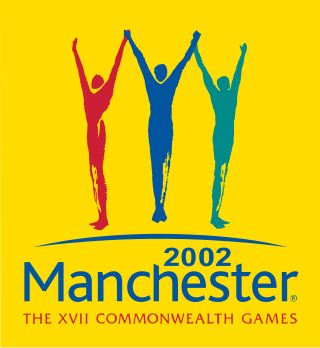
The 2002 Commonwealth Games, officially known as the XVII Commonwealth Games and commonly known as Manchester 2002, was an international multi-sport event for the members of the Commonwealth held in Manchester, England, from 25 July to 4 August 2002. The event was to be hosted in the United Kingdom to coincide with the Golden Jubilee of Elizabeth II, head of the Commonwealth, and Manchester was selected for the 2002 Games ahead of London using a recycled part of the project, which lost the 2000 Summer Olympics and Paralympics to Sydney, Australia. The 2002 Commonwealth Games was, prior to the 2012 Summer Olympics, the largest multi-sport event ever to be held in the UK, eclipsing the London 1948 Summer Olympics in terms of teams and athletes participating. The 2002 Commonwealth Games had the largest number of events of any Commonwealth Games in history, featuring 281 events across 17 sports.
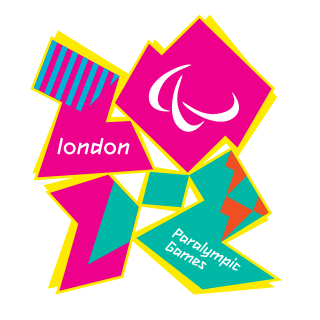
The 2012 Summer Paralympics, branded as the London 2012 Paralympic Games, were an international multi-sport parasports event held from 29 August to 9 September 2012 in London, England, United Kingdom. They were the 14th Summer Paralympic Games as organised by the International Paralympic Committee (IPC).
Sir Robert Andrew "Robin" Wales is a British Labour Party politician who served as the directly elected mayor of the London Borough of Newham from 2002 to 2018. Prior to taking up that newly created role, he was leader of Newham council since 1995, having been a councillor from 1982 to 1986 and 1992 to 2002.

London 2012 was the successful bid to host the 2012 Summer Olympics, held in London with most events taking place in Stratford in the borough of Newham. The British Olympic Association had been working on the bid since 1997, and presented its report to government ministers in December 2000.
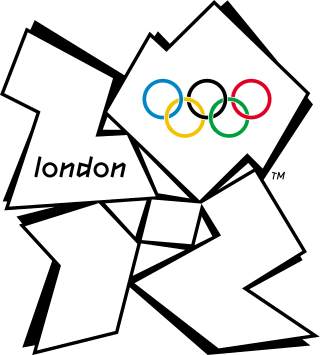
The 2012 Summer Olympics was an international multi-sport event held from 27 July to 12 August 2012 in London, England, United Kingdom. The first event, the group stage in women's football, began on 25 July at the Millennium Stadium in Cardiff, Wales, followed by the opening ceremony on 27 July. There were 10,518 athletes from 206 National Olympic Committees (NOCs) who participated in the 2012 Olympics.

The London Stadium is a multi-purpose outdoor stadium at Queen Elizabeth Olympic Park in the Stratford district of London. It is located in the Lower Lea Valley, 6 miles (10 km) east of central London. The stadium was constructed specifically for the 2012 Summer Olympics and 2012 Summer Paralympics, serving as the Athletics venue and as the site of their opening and closing ceremonies. Following the Games, it was renovated for multi-purpose use, and it now serves primarily as the home of Premier League club West Ham United.
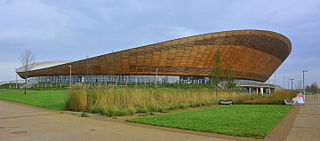
Lee Valley VeloPark is a cycling centre in Queen Elizabeth Olympic Park in Stratford, London, England. It is owned and managed by Lee Valley Regional Park Authority, and it was opened to the public in March 2014. The facility was one of the permanent venues for the 2012 Olympic and Paralympic Games.

Queen Elizabeth Olympic Park is a sporting complex and public park in Stratford, Hackney Wick, Leyton and Bow, in east London. It was purpose-built for the 2012 Summer Olympics and Paralympics, situated adjacent to the Stratford City development. It contains the Olympic stadium, now known as the London Stadium, and the Olympic swimming pool together with the athletes' Olympic Village and several other Olympic sporting venues and the London Olympics Media Centre. The park is overlooked by the ArcelorMittal Orbit, an observation tower and Britain's largest piece of public art.
The 2012 Summer Olympic development process began in 2005, following the successful London bid for the 2012 Summer Olympics, and ran until the games in 2012. While many of the plans were included in the bid portfolio, which gained the favour of the International Olympic Committee (IOC) over the four other bids on 6 July 2005, there were more details released and decisions made afterwards. The London Organising Committee of the Olympic Games and Paralympic Games (LOCOG) was created to oversee many of these developments, though such a large-scale event requires the co-operation of many other agencies. These organizations are sometimes integral parts of the London 2012 plans, while others are unrelated but can still have a great effect.

The London Organising Committee of the Olympic and Paralympic Games (LOCOG) was the organisation responsible for overseeing the planning and development of the 2012 Summer Olympic and Paralympic Games. It was jointly established by the UK Government's Department for Culture, Media and Sport, the Mayor of London and the British Olympic Association and was structured as a private company limited by guarantee. LOCOG worked closely with the publicly funded Olympic Delivery Authority (ODA), which is responsible for the planning and construction of new venues and infrastructure.
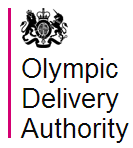
The Olympic Delivery Authority (ODA) was a non-departmental public body of the Department for Culture, Media and Sport, responsible for ensuring the delivery of venues, infrastructure and legacy for the 2012 Summer Olympic and Paralympic Games in London. Together with the London Organising Committee of the Olympic and Paralympic Games (LOCOG), the ODA was one of the two main agencies that organised the London Olympic Games.

The United Kingdom was awarded a number of major international sporting events during the 2010s leading to an idea of a 'Golden Decade' in British sport. The idea of the golden decade has been discussed in many newspapers and has been mentioned by former Prime Minister Gordon Brown and Lord Coe.
The School Games is an annual sporting competition for elite school-age athletes in the United Kingdom that began in 2006.
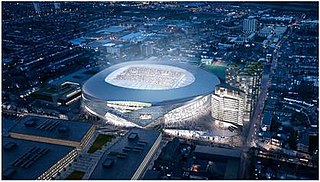
The Northumberland Development Project is a mixed-use development project that centres around the new Tottenham Hotspur Stadium which replaced White Hart Lane as the home ground of Tottenham Hotspur. On opening in April 2019, the stadium had a capacity for 62,062 spectators, later increased to 62,303, and was designed to host football as well as NFL games. The development plans also include 585 new homes, a 180-room hotel, a local community health centre, the Tottenham Experience, a Spurs museum and club shop, an extreme sports facility, as well as the Lilywhite House, which contains a Sainsbury's supermarket, a sixth form college and the club's headquarters.

Big Dance was a dance initiative in the United Kingdom, which happened every three years from 2006 to 2016. It was a nine-day biennial festival of dancing, mostly taking place in non-traditional dance spaces such as museums, shopping centers, parks, bridges, stations, galleries, and libraries, with the aim of inspiring people in different ways through dance. Initiated in 2006 by the first Mayor of London, Ken Livingstone, for the Greater London Authority, the programme was delivered in partnership with Arts Council England and delivered events and inspiration to be physically active through dance.

Here East is a media complex located in the Olympic Park in East London, built specially for the 2012 London Olympics. It is located at the site of the former Hackney Wick Stadium close to the Riverbank Arena in Hackney Wick.

The Manchester bid for the 2000 Summer Olympics and Paralympics was an unsuccessful campaign, first presented to the International Olympic Committee (IOC) on 1 February 1993. Ultimately it lost, having made it to the third round of voting with Sydney, Australia, going on to win the right to host the 2000 Summer Olympics.

East Village is a housing development in Stratford, East London that was designed and constructed as the Olympic Village of the 2012 Summer Olympics and has been converted for use as a new residential district, complete with independent shops, bars and restaurants. The area was formerly contaminated waste land and industrial buildings to the north of Stratford town centre.
ISO 20121 is a voluntary international standard for sustainable event management, created by the International Organization for Standardization. The standard aims to help organizations improve sustainability throughout the entire event management cycle.
Antony "Tony" John Sainsbury OBE has been the chef de mission of the British Paralympic team at five Paralympic Games, and was the chef de mission of the Independent Paralympic Athletes Team at the 2016 Summer Paralympics.

















